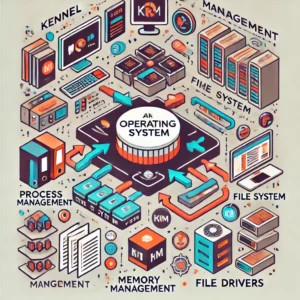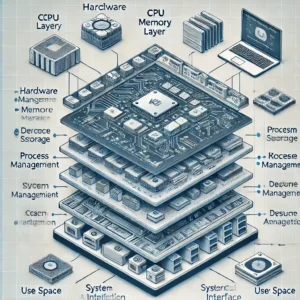Here you can download the free Operating System Notes Pdf – OS Pdf Notes latest and Old materials with multiple file links to download. Operating System Pdf Notes – OS Notes Pdf (OS Notes Pdf) starts with the topics covering Overview of Operating System, Process Concept, An operating system executes a variety of programs, Batch system – jobs, Time-shared systems, user programs or tasks etc

The Operating System Notes Pdf – OS Pdf Notes
Operating System Notes Latest Material Links
OS Complete Notes
Link – Complete Notes
Unit 1
Link – Unit 1 Notes
Unit 2
Link – Unit 2 Notes
Unit 3
Link – Unit 3 Notes
Unit 4
Link – Unit 4 Notes
Unit 5
Link – Unit 5 Notes
Operating System Notes Pdf (Old Material Links)
Unit1: OVER VIEW OF OPERATING SYSTEM
Operating System Notes PDF – OS Notes PDF


About
Are you a B.Tech student looking for comprehensive lecture notes on the Operating System (OS)? You’ve come to the right place! The Operating System is a fundamental subject in computer science and engineering, playing a pivotal role in managing computer hardware and software resources. This article provides detailed insights into the Operating System PDF Notes (OS Notes PDF), essential for any engineering student specializing in computer science or information technology. Let’s dive in and explore everything you need to know about downloading these valuable resources.
Operating System PDF Notes – OS PDF Notes
What is an Operating System?
An Operating System (OS) is a software that acts as an intermediary between computer hardware and users. It manages computer hardware resources and provides common services for computer programs. Essential for any computing device, the OS ensures the smooth operation of both user applications and system software.
Key Features of the OS Notes
The OS Notes are meticulously curated to provide a clear understanding of various topics, including process concepts, process synchronization, memory management, file system interfaces, mass storage systems, and security. The notes are structured to enhance learning and make complex concepts more approachable, providing practical examples and theoretical explanations.
OS Complete Notes: A Detailed Guide
Overview of the Complete OS Notes
The complete set of OS Notes provides a comprehensive understanding of all the units covered under the B.Tech syllabus. These notes are designed to help students grasp complex topics with ease and provide a solid foundation for further studies in computer science and engineering.
Benefits of Downloading the Complete Set
Downloading the complete set of OS Notes ensures that you have access to all the essential materials in one place. This not only saves time but also ensures a holistic understanding of the subject matter, crucial for excelling in exams.
OS Unit 1: Overview of Operating System
Topics Covered in Unit 1
Unit 1 focuses on the Overview of the Operating System, including different types of operating systems like batch systems, time-shared systems, and their applications. It covers the basic structure and functionality of an operating system, which is fundamental to understanding how computer systems operate.
Key Learning Outcomes
By the end of Unit 1, students will understand the basic principles of operating systems, the various types and their applications, and how these systems manage computer hardware and software resources.
Download Link for OS Unit 1
To access the detailed notes for Unit 1, click here to download OS Unit 1.
OS Unit 2: Process Concept
Introduction to Process Concept
Unit 2 delves into the Process Concept, explaining what a process is, the lifecycle of a process, and the importance of process management within an operating system. It also discusses batch systems, time-shared systems, and the execution of user programs or tasks.
Detailed Topics and Applications
This unit also covers how processes are scheduled, the differences between jobs and processes, and the various states a process can be in during its execution.
Download Link for OS Unit 2
To access the detailed notes for Unit 2, click here to download OS Unit 2.
OS Unit 3: Process Synchronization
Understanding Process Synchronization
Unit 3 is dedicated to understanding the concept of Process Synchronization, which is crucial for ensuring data consistency when multiple processes access shared data concurrently. The unit introduces the critical-section problem and provides both software and hardware solutions to address it.
Essential Concepts in Unit 3
Key concepts include atomic transactions, ensuring atomicity, and mechanisms to prevent data inconsistency during concurrent access. It also explores practical applications, such as the producer-consumer problem.
Download Link for OS Unit 3
To access the detailed notes for Unit 3, click here to download OS Unit 3.
OS Unit 4: Memory Management
Types of Memory Management Techniques
Unit 4 explores various memory management techniques, such as paging and segmentation. It provides a detailed description of how memory is organized and managed in a computer system, including hardware considerations like the Intel Pentium architecture.
Design and Analysis Techniques
The unit covers practical aspects, such as memory protection and the role of caches and registers in improving CPU efficiency.
Download Link for OS Unit 4
To access the detailed notes for Unit 4, click here to download OS Unit 4.
OS Unit 5: Principles of Deadlock
Principles and Prevention of Deadlocks
Unit 5 discusses the Principles of Deadlock, a critical issue in operating systems where processes become stuck in a waiting state. It explains the conditions that lead to deadlocks and explores strategies for preventing and managing deadlocks in computer systems.
Methods and Applications
The unit also covers deadlock detection and recovery methods, helping students understand how to design systems that minimize the risk of deadlocks.
Download Link for OS Unit 5
To access the detailed notes for Unit 5, click here to download OS Unit 5.
OS Unit 6: File System Interface and Implementation
Principles of File Systems
Unit 6 introduces the File System Interface and Implementation, discussing the fundamental concepts of file systems, such as file types, file structures, and the organization of data within a file system.
Structure and Types of File Systems
The unit explores different file system types, such as FAT, NTFS, and ext3/ext4, and discusses their characteristics and applications in operating systems.
Download Link for OS Unit 6
To access the detailed notes for Unit 6, click here to download OS Unit 6.
OS Unit 7: Mass-Storage Systems
Overview of Mass-Storage Structure
Unit 7 provides an overview of Mass-Storage Systems, discussing the architecture and management of mass-storage devices, such as hard drives and SSDs.
Techniques and Implementations
The unit covers storage allocation methods, disk scheduling algorithms, and techniques to optimize storage performance and reliability.
Download Link for OS Unit 7
To access the detailed notes for Unit 7, click here to download OS Unit 7.
OS Unit 8: Protection and Security
Principles of Protection and Security
Unit 8 focuses on the Principles of Protection and Security in operating systems. It discusses various protection mechanisms, such as access control, and security measures to protect against unauthorized access and data breaches.
Implementation Techniques
The unit also covers security policies and mechanisms to ensure data integrity and confidentiality in multi-user environments.
Download Link for OS Unit 8
To access the detailed notes for Unit 8, click here to download OS Unit 8.
Conclusion
The Operating System is a fundamental subject for any computer science and engineering student. These comprehensive notes provide all the necessary information and resources to excel in this subject. With detailed explanations, practical examples, and easy-to-follow guides, these notes are an invaluable tool for any B.Tech student.
FAQs
- Where can I download the Operating System Notes PDF?
- You can download the notes from the provided links for each unit or the complete set from Smartzworld.
- How to download the OS Notes PDF?
- Simply click on the download links provided for each unit or the complete notes.
- How many modules are covered in the OS Notes PDF?
- The OS Notes PDF covers eight modules according to the standard syllabus.
- Topics covered in the OS Notes PDF?
- Topics range from the overview of operating systems, process concepts, synchronization, memory management, file systems, mass storage, and security.
- Where can I get the complete OS Handwritten Notes PDF Free Download?
- The complete handwritten notes are available for free download on Smartzworld.
I hope you are having a wonderful day! I have a small favor to ask. I’m aiming to rank in the top 10 on the Chat GPT store, and I can’t do it without your amazing support. Could you please use my GPT https://bit.ly/GPT_Store and leave some feedback? Your positive reviews would mean the world to me and help me achieve my goal. Additionally, please bookmark my GPT for easy access in the future.
Thank you so much for your kindness and support!
Warm regards.
TEXT BOOKS : Operating System Notes pdf – OS Notes pdf – OS Pdf notes
1. Operating System Concepts- Abraham Silberchatz, Peter B. Galvin, Greg Gagne 7th Edition, John Wiley.
2.Operating systems- A Concept based Approach-D.M. Dhamdhere, 2nd Edition, TMH
REFERENCES : Operating System Notes pdf – OS Notes pdf – OS Pdf notes
- Operating Systems’ – Internal and Design Principles Stallings, Fifth Edition–2005, Pearson education/PHI
- Operating System A Design Approach-Crowley, TMH.
- Modern Operating Systems, Andrew S Tanenbaum 2nd edition Pearson/PHI.
Note :- These notes are according to the r09 Syllabus book of JNTUH. In R13 ,8-units of R09 syllabus are combined into 5-units in r13 syllabus. Click here to check all the JNTU Syllabus books




